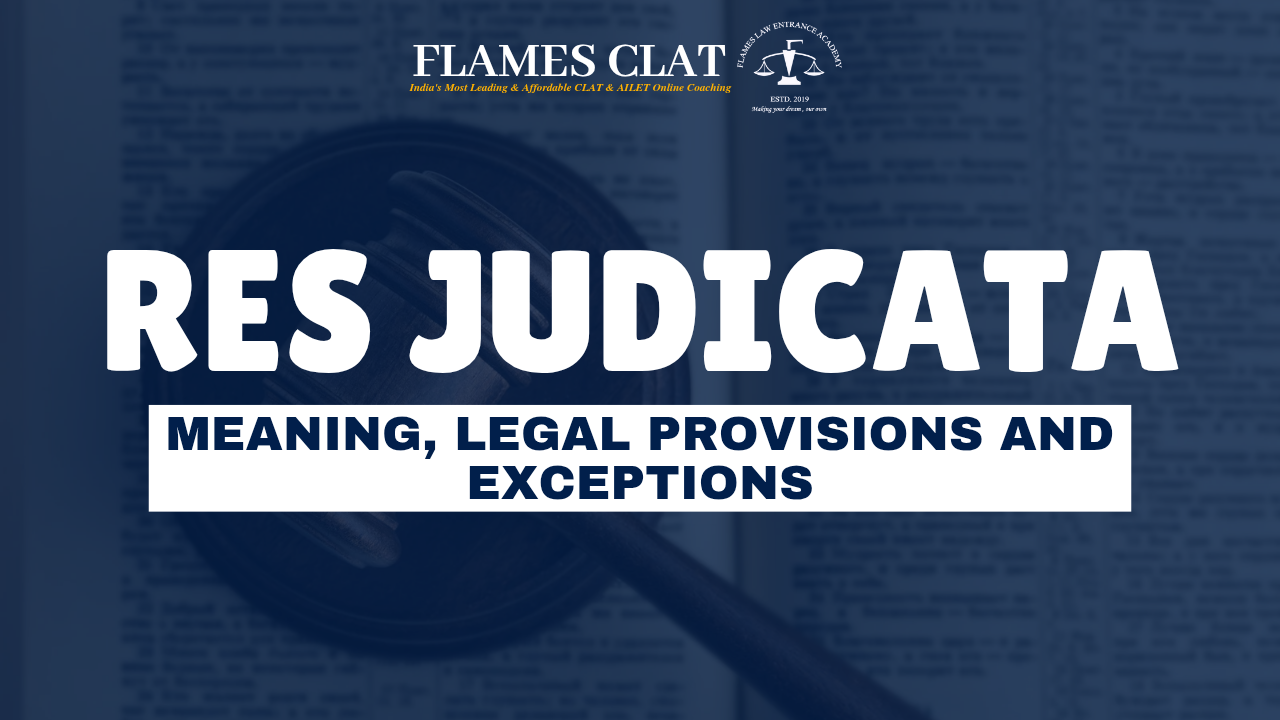Res Judicata: Meaning, Legal Provisions and Exceptions
At Flames CLAT, we feel that cracking CLAT and achieving success in law school is more than memorizing legal maxims. Such as Res Judicata, a Latin Maxim that students memorize without actually comprehending its influence in the justice system. In our classes, we make such doctrines come alive using real-life examples, landmark judgments, and mock case discussions that leave a long lasting understanding of the topic to students.
What is Res Judicata?
“Res Judicata” is Latin for “a matter already judged.” It is a legal principle that puts a bar over the same parties to file the same case for another trial. Imagine you sue someone over a property dispute, and the court gives its final decision. You can’t file the exact same case again in a different court just because you’re unhappy with the decision of the court. Res Judicata bars that, it helps in decreasing the long pendency of cases, preserves judicial resources, and protects people from legal harassment.
Legal Provisions
Res Judicata derives its legal backing from Section of the Code of Civil Procedure (CPC). It applies to civil cases and mentions that no court shall try any suit or issue which has already been directly and substantially decided in a previous suit between the same parties.
The essentials of Res Judicata to apply are:
- The matter was already decided by a competent court.
- The parties in the new suit are the same (or legally related to those in the previous one).
- The issue raised is directly and substantially the same.
Need of Res Judicata
Res Judicata is a pillar and necessity of judicial efficiency and fairness. Imagine the complete chaos that would result from people filing the same case over and over again. Justice would be postponed and courts would be overloaded. And people would live in fear of never-ending litigation.
That’s why Res Judicata is crucial. It:
- Encourages finality in legal proceedings.
- Prevents waste of court time.
- Protects individuals from being dragged into the same legal battle repeatedly.
Exceptions
Of course, the application of Res Judicata isn’t always straightforward. Courts often face tricky situations:
- What if the earlier decision was made by a court lacking proper jurisdiction?
- What if the previous case was dismissed without a full trial?
- What if new facts emerge?
In such cases, judges look carefully at whether the issue was truly decided on its merits. If it wasn’t, Res Judicata might not apply.
Landmark Case Law
The first and foremost case that CLAT aspirants need to know about is Satyadhyan Ghosal v. Deorajin Debi (1960). In this ruling the Supreme Court of India made clear that Res Judicata includes not only the decision of a case but also every material question determined in an earlier proceedings.
Another significant case is Gulabchand Chhotalal Parikh v. State of Gujarat (1965) which clarified that Res Judicata is applicable to constitutional cases in addition to private civil suits.
How We Tackle This at Flames CLAT
At Flames CLAT, we ensure that doctrines like Res Judicata aren’t just legal maxims that students memorize, we make them understand and instill them in their minds. We break it down with relatable examples, conduct mini mock trials, and test our students with CLAT style MCQs and writing practice.
Join our Flames CLAT Family at https://t.me/flamesclat
For Informative videos, do check out https://youtube.com/@flamesclat?si=-PqiaRLEjutM-iYj




Write a Review
Your email address will not be published. Required fields are marked *